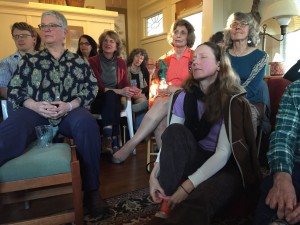Conversation about aging with Dr. Jenny Sasser
 On Sunday afternoon, January 25, the Portland Shambhala Center Aging group met for its their winter gathering at the home of Annie Popkin and David Parker. Thirty-nine of us (of widely varying ages) showed up for the talk, discussion, pot luck dinner and social time.
On Sunday afternoon, January 25, the Portland Shambhala Center Aging group met for its their winter gathering at the home of Annie Popkin and David Parker. Thirty-nine of us (of widely varying ages) showed up for the talk, discussion, pot luck dinner and social time.
Dr. Jenny Sasser, Ph.D., Chair, Department of Human Sciences Director, Gerontology Program, at Marylhurst University, talked to us and led a discussion. She described herself as both a teacher and a learner. The manifesto on her blog explains why it’s called “gero-punk”:
"To be a gero-punk is to bravely and critically reflect upon,
interrogate, and create new ways of thinking about and experiencing
the aging journey. A gero-punk resists normative aging ideology,
and challenges others to do so as well, or at least to better
understand the implications of normative aging ideology before
they live by its rules."

The face of aging at the Portland Shambhala Meditation Center
Makes sense, huh? Jenny (we quickly got on a first-name basis) is an active Buddhist practitioner. She said she was very happy to join our group because of our similar interests and values. We went around the room and introduced ourselves, saying something about what we were up to, which included going to school full- or part-time, sharing on Facebook, working full- or part-time, learning patience, teaching online, and finding kin. It turned out that most of us felt that we were dealing with the speed of our surrounding culture and of the aging process itself.
Jenny got the discussion going by talking about aging as a cross-generational experience: that is, everyone ages all the time no matter how old (or young) they are. In some cases it’s called “growth.” It’s part of the natural course of life and we discussed how we don’t see or experience aging the in same way at the different stages of our lives — and we may not have access to some of the experience of aging until later on. But all of us do experience aging, one way or another all the time. Gerontology as an academic field, however, is quite a contradictory hodgepodge, with roots in medicine, sociology, psychology, and even business. It’s a fractured field, with spotty and fractured funding. And the field is very young.
It’s an open question how we construct or imagine our very human process of aging. There are a lot of messages in our world that tell us what aging is and how we should feel about it. Lucky that we’re meditators. We might see through some of the aching joints, or smiling grandchildren, or unfamiliar wrinkles (see one of Jenny’s posts), or wisdom, or any of the other pleasures of aging and learn to celebrate.
The next meeting of the aging group is scheduled for May 16th.
— John Smith







